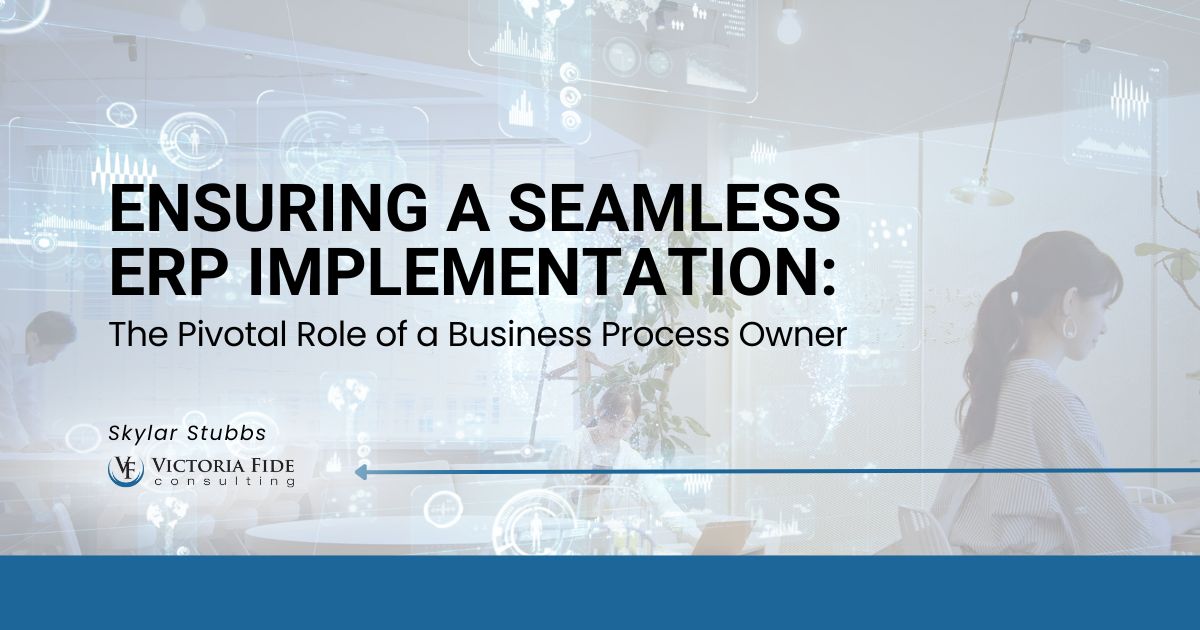
Ensuring A Seamless ERP Implementation: The Pivotal Role of a Business Process Owner
Fully understanding and leveraging the integral functions of a Business Process Owner (BPO) can transform your Enterprise Resource Planning (ERP) implementation from a challenge into a powerful opportunity. In this article, discover the pivotal role of a Business Process Owner (BPO) and how mastering their responsibilities can drive success for the entire project. We will dive into what a BPO is within the context of ERP projects and unpack their primary responsibilities. By the end, you’ll be equipped with the insights needed to significantly contribute to your organization’s ERP journey and ensure a seamless transition.
Table of Contents
What is a Business Process Owner?
In the context of an ERP implementation project, a BPO is a key individual tasked with overseeing and managing the implementation of specific business processes within the organization that will be affected by the ERP system. This individual serves as the primary point of contact and subject matter expert for their designated business processes throughout the implementation lifecycle.
There are typically many BPOs on a single project, each specializing in their specific area of expertise. The business process owner collaborates closely with cross-functional teams, including project managers, IT specialists, end-users, external consultants, and other BPOs to ensure that the ERP system is configured and tailored to meet the unique requirements of their processes. They are responsible for articulating the business requirements, defining process workflows, and identifying opportunities for optimization and improvement to enhance operational efficiency and effectiveness.
The BPO acts as a bridge between business stakeholders and technical teams, speaking for the business and ensuring that the implemented ERP solution aligns with strategic objectives. By facilitating communication, gathering feedback, and managing expectations in their assigned area, they help ensure that the ERP implementation meets business goals and delivers expected outcomes.
Throughout the project, the BPO plays a critical role in driving organizational change by championing new processes, fostering user adoption, and facilitating training and support initiatives to empower end-users to leverage the full capabilities of the ERP system. Ultimately, the BPO serves as a steward of business processes, guiding their evolution and optimization to maximize the value derived from the ERP implementation.
What are the primary responsibilities of a Business Process Owner?
Define Requirements
A BPO is instrumental in the requirement gathering process due to their in-depth understanding of the organization’s workflows and operational needs. Their role involves collaborating with stakeholders across departments to define and prioritize business requirements that will be addressed by the new ERP system. BPOs leverage their expertise to ensure that requirements are accurately documented and translated into functional specifications that align with strategic objectives. They participate in design workshops and process discussions to voice requirements and ensure critical processes will be effectively supported by the ERP solution.
Additionally, BPOs play a vital role in reviewing and refining requirements, providing clarity, and ensuring that they reflect the organization’s current and future needs. By actively engaging in requirement gathering and documentation, BPOs ensure that the ERP implementation addresses key business challenges, maximizes operational efficiency, and delivers value to the organization.
Make Process Decisions
As stated in the name, a BPO is responsible for the business processes within the BPO’s sphere of responsibility. Within an ERP implementation, there are many key decisions which drive the direction of the solution and impact the current state business processes. Most of these decisions must be made by the BPO. By anticipating this need, having a vision for the future, and working collaboratively with other stakeholders, a BPO will be able to make good decisions in a timely manner and keep the project moving forward toward success.
Understand the Big Picture
Understanding the big picture during an ERP implementation project is essential for an effective BPO. As the BPO is defining requirements and making business process decisions, it’s critical to understand how those decisions impact the rest of the organization. The best ERP solution is one that is design collaboratively with all the BPOs and considers the needs of the entire organization rather than just the portion represented by a single BPO. This ensures alignment with organizational goals, facilitates the integration of business processes, and sets a foundation to effectively manage the change. By grasping the broader context of the implementation, the BPO can steer the project toward success, ensuring that the ERP system not only meets immediate needs but also supports long-term growth and strategic objectives.

Transformation is not easy, but it doesn’t have to be impossible. Take control of your project’s success today and schedule a free 30-minute consultation to find out how Victoria Fide can equip you for transformational success.
Provide Visibility
A BPO plays a pivotal role in providing visibility to both their team and project leadership during an ERP implementation. By maintaining open communication channels and sharing relevant information, the BPO ensures that team members are well-informed about project objectives, milestones, and progress. This visibility fosters transparency and collaboration while empowering team members to understand their roles and responsibilities within the project.
Additionally, the BPO serves as a liaison between the implementation team and executive leadership, relaying updates, addressing concerns, and providing insights into the impact of the ERP system on business processes. By facilitating clear communication and providing regular updates, the BPO helps to build trust, mitigate risks, and ensure that the ERP implementation stays on track to achieve its goals.
Assist with System Testing
BPOs play a crucial role in testing a new ERP system by providing valuable insights and expertise related to the specific business processes they oversee. They contribute to testing efforts by ensuring that the ERP system aligns with the organization’s requirements and effectively supports the workflows and objectives of their designated processes.
BPOs collaborate with testing teams to develop comprehensive test plans and scenarios that accurately reflect real-world use cases, including critical business functions and edge cases. They leverage their deep understanding of the business processes to identify potential issues, validate system configurations, and verify that data migration and integration processes are executed accurately.
BPOs actively participate in user acceptance testing (UAT) to validate the ERP system’s functionality, usability, and performance from the end-users’ perspective. Their involvement in testing ensures that the ERP system meets the needs of the organization and delivers the expected benefits.
Create and Maintain Process Documentation
Creating and maintaining process documentation is paramount for the success of an ERP implementation project. Documenting existing business processes provides a baseline for understanding current workflows and identifying areas for improvement. This documentation serves as a reference point for configuring the ERP system to align with the organization’s unique requirements.
Moreover, clear and comprehensive process documentation is essential for training end-users on how to use the new ERP system effectively. It ensures that employees understand the updated processes and can adapt to the changes seamlessly, minimizing disruptions during the implementation phase.
Additionally, maintaining up-to-date process documentation throughout and after the ERP implementation enables the organization to capture any modifications made to the system and ensure ongoing compliance with internal policies and external regulations. Ultimately, BPOs must thoroughly document processes to maximize the benefits of an ERP implementation, enhancing organizational efficiency and driving long-term success.
Facilitate End-User Training
BPOs play a critical role in training users in the new ERP system by designing and developing training materials, documentation, and resources tailored to the specific needs of end-users. Leveraging their deep understanding of the organization’s processes and workflows, BPOs ensure that training programs are comprehensive, relevant, and aligned with organizational goals. They facilitate training sessions, workshops, and demonstrations to educate end-users on how to effectively utilize the ERP system to perform their tasks efficiently.
BPOs provide ongoing support and guidance to users, addressing questions, concerns, and challenges that arise during the learning process. By actively engaging in user training, BPOs empower end-users to leverage the full capabilities of the ERP system, driving user adoption, and maximizing the return on investment for the organization.
Who should be given the BPO role?
It can be intimidating to find the right people to fill the BPO roles on an ERP project given how critical the role is. Some factors to consider include:
Does the person have authority?
It is important for a BPO to have authority to make key decisions about requirements, business process changes and even some organizational changes. If the person you are considering is not in a management role which already comes with this authority, the person must be assigned this authority for the project in order to be successful in the role. Otherwise, the decision-making process will take too much time or, if the BPO makes decisions that are overruled later, a lot of rework will occur.
Does the person have the respect of their team?
Whether the person is in a management role or not, it is imperative the person assigned to this role has the respect of the individuals within the department the person will be representing. Without this respect, the person will be ineffective at being a change agent and pushing the upcoming organizational changes through the company. Any decisions made will likely be ignored and there will be a lot of assertions made about the poor quality of the solution and the need to change it to be more like the old system.
Does the person have bandwidth?
The BPO role requires a significant amount of time due to the many important responsibilities throughout the ERP implementation project. It is often recommended that anyone assigned to the BPO role be assigned full time to the project and any previous responsibilities be backfilled. While the timeline and scope of the project may not require that amount of dedication to the project, a person who is already consumed by current responsibilities is going to be unable to fill the role at a level that is required for a successful implementation.
Does the person have a vision for the future?
As a BPO, the person will have a direct influence on the capabilities that are built into the ERP system and the processes that are implemented. If the BPO does not have a vision for the direction the business is going and a vision for how to enhance the current processes, the decisions that are made will end up causing the new ERP solution to look much like your current system. Even if the person doesn’t have the ability to come up with new strategies, the person must at a very least be able to see the vision that is set by the executive leadership team.

Takeaways
Business Process Owners (BPOs) play an integral role in the successful implementation and sustainability of an ERP system. Through their deep understanding of organizational processes and strategic vision, BPOs bridge the gap between technical teams and business objectives. By providing visibility, assisting with system testing, and facilitating comprehensive end-user training, they ensure that the ERP system is fully optimized to meet the needs of the organization.
As organizations strive to crack the code on ERP implementation success, understanding and empowering the role of BPOs will be more critical than ever before. If you are either considering an ERP implementation or in the midst of one, contact us today to see how we can support your transformation and help you achieve your business goals.
